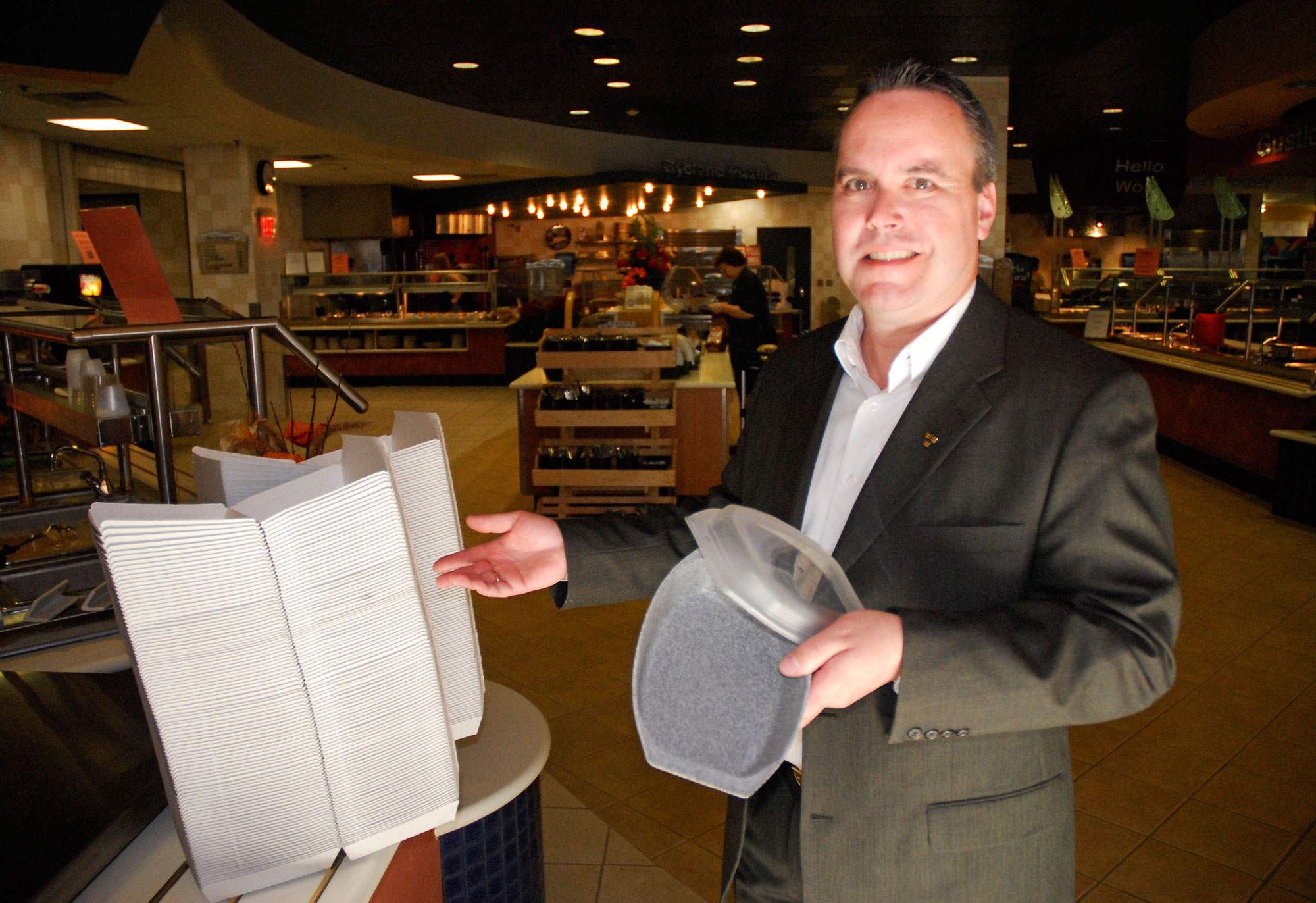
Late last month, Director of Dining Services Steve Kjellgren announced that student meal plan allocations would change from the current semester system to operating on a month-to-month basis. Kjellgren also released the much-anticipated solution to the demand for Tupperware: containers owned, cleaned and regulated by the Market Place.
Kjellgren explained that the meal plan change was an effort to keep fee increases to a minimum and to allow Dining Services to manage revenue in a month-to-month approach. Students will be given monthly allocations based on the number of service days in a month, with a $20.00 rollover into the next month.
Kjellgren explained that this change is a response to volatile predictions for the market in the upcoming year. “The commodity and energy markets are some of the most unpredictable; we are seeing anywhere from 9-15 percent increases across all lines of commodities: dairy, meat, bakery items, beverages, produce, prepared grocery items [and the] cost of supplies,” Kjellgren said.
“How can we minimize the impact on students and keep their meal plan as low as possible while paying our bills at the same time? Because of this volatility we are going to be very conscious and watch our monthly budgets very closely,” said Kjellgren.
Sophomore Communication Studies Major Natalie Brady is optimistic about these changes. “It’s going to be easier for students to keep track of where their money is. It is nice that each month, money will rollover and within that month you will be able to spread out what to buy.” Brady said. She said that many students don’t budget their money throughout the semester, and this will help students avoid “having two weeks to spend $400 to spend on chips at the end of the semester.”
While prices in the Market Place are expected to increase over the course of next year, Kjellgren has clarified that students will continue to pay a fixed meal plan price at the beginning of the semester. “We’ll determine the monthly allocation based upon the number of service days in the month. We won’t raise the meal plan fee, but if prices of one item or another skyrockets and we have to increase the price in the Market Place, we’ll make sure the price change is prominently noted so students can make dining decisions accordingly.”
Senior Philosophy Major Andi Twiton serves on the Kitchen Cabinet, an advisory board to Kjellgren comprised of students, faculty and members of Gustavus Greens and Student Senate. Twiton said that these changes might encourage students to take more responsibility and make better purchasing choices. The change to monthly allocation will go along with the Market Place’s goal of teaching students “[how to be] in charge of [their] own finances and [make] economical choices,” Twiton said.
In addition to the changes in meal plan allocation, Dining Services will also be incorporating three different sizes of Tupperware that will be available to students at no cost, said Kjellgren. “It will be a trial run. We will buy a couple thousand [containers] to start with. I hope everyone will embrace this program. There will be a rack with all [of] them in the Cafeteria. It will be an honor system. I don’t know of any other college in the country that is doing it, and there will be a lot [of] eyes on us seeing how successful it is,” Kjellgren said.
He said that the Dining Services staff is really excited about this change because they see students excessively using to-go boxes day after day. “Gusties use over a quarter of a million to-go boxes a year … [that] doesn’t include soup bowls (60,000) or paper beverage containers (290,000),” Kjellgren said.
The success of this program requires the support of students. “I get to-go boxes so often and I just throw them away,” said Brady. “To-go boxes are more convenient, but overall Tupperware is a better idea, because people won’t waste as much. You see people who get a to-go box with one little wrap in it.”
Twiton’s only reservation with the program is the difficulty in getting students to return the containers. “A library custodian said every day they have to pick out plates and forks and cups out of the trash. The Cafeteria loses money from lost plates, lost mugs, lost silverware. Because of that trend, it makes me worry the Tupperware won’t stick around.”
Kjellgren said that the Tupperware will be community-owned and that several departments and organizations have already put money toward this initial first purchase. Student Senate is one such organization, and Sophomore Student Senate Co-President Lucas Neher thinks that students will feel a sense of ownership regarding the containers.
“We need everyone to be aware that right now you won’t get charged to use these, and it is everyone’s responsibility that they get brought back to the Cafeteria … it is going to be a community project and this is going to be a service for free for the students,” Neher said.
First-year Student Senate Co-President Kim Braun said that the Market Place has been open to suggestions during this entire process. “The addition of Tupperware containers is a change requested by the students that the Market Place is doing for the students. It is another example of how they are there working for us and willing to develop and change for … what the Gustavus community wants,” Braun said.
Braun said that students have reason to be optimistic about changes in the Market Place. “It’s something we will have to adjust to, but once we get used to [it], it’s going to be for the best. The monthly budget is going to be an effective and efficient way for the Market Place to budget and [a] way for the students to learn about responsibility, and the Tupperware is just altogether necessary and a great idea,” she said.
Photo by: Alex Stassen